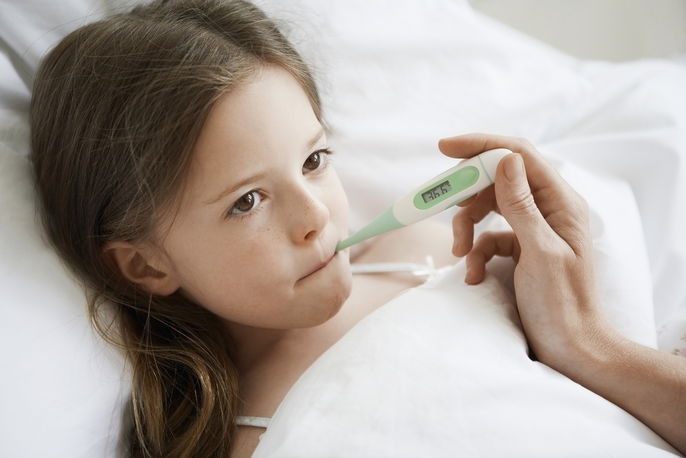Pneumonia in kids is an infection of the lungs caused by bacteria or a virus that can cause flu-like symptoms that worsen over time and can result in rapid breathing and shortness of breath.
Pneumonia in kids can generally be treated without the need for hospitalization, however difficulty eating or excessive tiredness can be signs of a more severe illness that needs to be treated in the hospital. In these cases, supplemental oxygen and respiratory therapy may be indicated in addition to treatment with antibiotics and antivirals.
It is important to consult your pediatrician if you suspect your child may have pneumonia. Children with shortness of breath and tiredness need to be seen immediately in the emergency department.

Common symptoms
The most common symptoms of pneumonia in kids include:
- Fever over 100.4ºF (38ºC);
- Chills;
- Productive cough;
- Loss of appetite;
- Chest pain;
- Rapid, shallow breathing with nasal flaring;
- Chest retractions while struggling to breathe;
- Tiring easily and no desire to play.
It is important to take the child to the pediatrician as soon as symptoms arise in order to confirm a diagnosis and start treatment as soon as possible to prevent complications.
Also recommended: Pneumonia: Symptoms (w/ Online Quiz ), Types & Treatment tuasaude.com/en/pneumonia-symptomsConfirming a diagnosis
The diagnosis of pneumonia in kids is usually made by a pediatrician based on an evaluation of symptoms and respiratory frequency. A chest x-ray is also typically recommended to confirm the degree to which the lungs are affected.
A doctor may also order other tests like blood or sputum cultures to identify the microorganism that is causing the pneumonia.
Main causes
Pneumonia in kids is usually caused by a virus and develops as a complication of the flu or other viral infections like adenovirus, respiratory syncytial virus (RSV), and parainfluenza types A, B, or C. These types of pneumonia are called viral pneumonia.
Kids can also develop bacterial pneumonia, most commonly caused by Streptococcus pneumoniae, Klebsiella pneumoniae or Staphylococcus aureus.
Treatment options
Treatment for pneumonia in kids is managed by a pediatrician, and may involve:
1. Medications
A pediatrician may prescribe medications like analgesics and anti-inflammatories, such as acetaminophen or ibuprofen, to help relieve symptoms like malaise. Dosing of these medications will be determined by a pediatrician based on the child's weight.
In the case of bacterial pneumonia, antibiotics like amoxicillin, azithromycin, or clarithromycin may also be prescribed to help combat the infection. Duration of treatment can vary based of the severity of the infection, but usually lasts for 7 to 10 days.
In the case of viral pneumonia, antiviral medications like oseltamivir (Tamiflu) may be indicated during the first few days of illness, however many cases of viral pneumonia improve on their own with rest and home care without the need for antivirals.
2. Nebulizer treatments
Nebulizer treatments with saline solution or bronchodilators can help clear secretions and make it easier to breathe.
3. Hydration
Pushing fluids is important to prevent dehydration. This may involve more frequent breastfeeding or bottle feeding, oral rehydration salts, homemade oral rehydration solutions, soups, juices, and/or water in sufficient amounts.
Kids that present with signs of dehydration may need to be admitted to the hospital for IV fluids.
Read about signs of dehydration in babies.
4. Supplemental oxygen
In more serious cases, in which the child has difficulty breathing or low blood oxygen levels, the child may require supplemental oxygen therapy.
5. Respiratory therapy
In cases of more severe pneumonia, respiratory therapy may be recommended to help clear secretions that have accumulated in the lungs in order to improve lung function.
Home care
Important care instructions for pneumonia in kids include:
- Getting adequate rest and avoiding public spaces like daycare and school;
- Maintaining a healthy, well-balanced diet that includes fruits and vegetables;
- Dressing the child appropriately according to the weather/season;
- Avoiding drafts after getting out of the bath;
- Not smoking around the child.
In addition, avoid giving your child medication without talking to your pediatrician first, as some medications can make pneumonia worse.






























